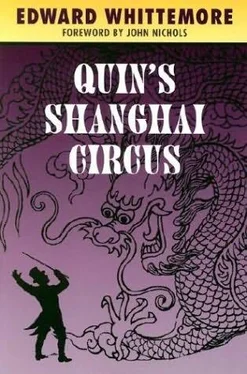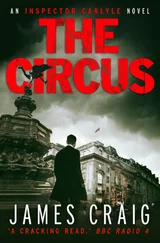Edward Whittemore - Quin’s Shanghai Circus
Здесь есть возможность читать онлайн «Edward Whittemore - Quin’s Shanghai Circus» весь текст электронной книги совершенно бесплатно (целиком полную версию без сокращений). В некоторых случаях можно слушать аудио, скачать через торрент в формате fb2 и присутствует краткое содержание. Жанр: Фэнтези, на английском языке. Описание произведения, (предисловие) а так же отзывы посетителей доступны на портале библиотеки ЛибКат.
- Название:Quin’s Shanghai Circus
- Автор:
- Жанр:
- Год:неизвестен
- ISBN:нет данных
- Рейтинг книги:3 / 5. Голосов: 1
-
Избранное:Добавить в избранное
- Отзывы:
-
Ваша оценка:
- 60
- 1
- 2
- 3
- 4
- 5
Quin’s Shanghai Circus: краткое содержание, описание и аннотация
Предлагаем к чтению аннотацию, описание, краткое содержание или предисловие (зависит от того, что написал сам автор книги «Quin’s Shanghai Circus»). Если вы не нашли необходимую информацию о книге — напишите в комментариях, мы постараемся отыскать её.
Quin’s Shanghai Circus — читать онлайн бесплатно полную книгу (весь текст) целиком
Ниже представлен текст книги, разбитый по страницам. Система сохранения места последней прочитанной страницы, позволяет с удобством читать онлайн бесплатно книгу «Quin’s Shanghai Circus», без необходимости каждый раз заново искать на чём Вы остановились. Поставьте закладку, и сможете в любой момент перейти на страницу, на которой закончили чтение.
Интервал:
Закладка:
Long ago they changed my life, those two anonymous men. The one by listening, the other by speaking. And although now I know the name of one of them, the one who was your father, the other is still unknown to me after all these years. Is this best? Perhaps. Perhaps it can be no other way with us. Perhaps that kind of mercy must always remain a mystery.
Yes, she added, it seems so.
She went on to speak of the General and his death, her flight to China, the year in a narcotized Shanghai dream watching false images being projected on the wall. She spoke of the night a rickshaw carried her down Bubbling Well Road to the outskirts of the city, to the gloomy cavern of the circus master’s last performance.
She took his hand.
When he was gone she went to her shrine and drew back the straw curtains. On the platform stood the ivory elephant supporting the dais in the shape of a lotus. The shrine faced west. She climbed up to the lotus and seated herself as the sun dropped over the city.
She sat in za-zen , her hands forming the mudra of knowledge. The first part of her life had been given to the ten thousand men who had come to explore her tattoo, the mythical epic of the dragon, the last part to the General and the circus master, so unalike and yet so similar in the grotesque ways in which they died.
She recalled the apocryphal chronicle from the Han dynasty that had described the terrors of the Gobi Desert. The chronicler had feared the sandstorms and the disappearing rivers, the mirages, above all the secret agents who represented the princes and despots of a thousand lawless regions, a danger thereby to the rule of the Son of Heaven.
He claimed this was his concern, but then he asked a question that revealed the true nature of the fear that had made him tremble when the caravans passed, a possibility far more frightening than the massed armies that might be sent by a thousand lawless princes and despots, a vision that horrified him because it was the ultimate threat to the Son of Heaven and the integrity of his rule.
Or is it perhaps that they represent no one at all?
Mama sat in her thatched hut raised on stilts, a structure still used by peasants in the countryside in the tradition of a shrine first built in Japan two thousand years ago on a peninsula in the south.
The sacred object in that shrine was a round metal disk, the mirror that had belonged to the sun goddess before she was enticed from her cave by music, thereafter to become the ancestress of Japan’s emperors. For two thousand years, at the end of every second decade, the shrine of the sun goddess had been torn down and rebuilt exactly as it was before, thus to survive unchanged through the reigns of one hundred and twenty-four emperors.
And so it was with men who were destroyed in order that the shrine might never grow old, through change to remain the same, destroyed and resurrected by ten thousand men or by two men who painted tattoos on their minds, followed the tale of the dragon, joined a caravan that yet again was setting out across the desert in search of a fabled kingdom.
The tiny woman bowed her head. Fate had taken her sons and she had nothing else to give, but still there were no tears in the emerald eye that gathered together the final light of that autumn day above the Imperial moat.
Nichiren
No, they will not believe you but you must tell them the truth all the same. You must say that once a man dreamed a wind would come, he dreamed it and willed it, and because he did the wind came.
—The monk Nichiren speaking to his disciples after he destroyed the fleet of Kublai Khan
The day before his ship sailed Quin received a postcard at his hotel across from Tokyo station. The postmark showed that it had been sent to his old address at the time of Big Gobi’s funeral. There was a picture of a fishing village, an illegible message, and a scrawled signature.
Geraty.
Quin asked about the village and was told it was three hours away by train, on the coast south of Kamakura. For weeks he had been trying to find Geraty, but the answer everywhere was the same. No one had seen the giant with the bulging eyes since early in the summer. It was assumed that he had either died or left Tokyo.
There was only one train to the village and it left in a few minutes. Another returned late at night. Quin ran across the street to the station and found the train just as it was beginning to move.
They reached the tiny village early in the afternoon. Quin went first to the police box on the square. After that he intended to try the post office, the inn, lastly the shops that sold horseradish.
The policeman seemed to understand a few words of English. Quin used his hands to describe his man.
A foreigner. Also an American but much taller, much fatter. A long, filthy overcoat, a black hat pulled down to the ears. Layers of sweaters and a swath of red flannel at the neck. Alcohol. Horseradish. Head shaved, white stubble. Purple veins in the face. A gigantic nose, sacks for arms. A belly this far out. Eyes a skull could not hold.
The policeman watched him politely. When Quin finished he asked questions with his hands and his few words of English.
Huge? Yes, he understood.
Whiskey? Sake ? He frowned. Impossible.
Prominent eyes? He smiled. Certainly.
A shaved head? The policeman looked confused.
An overcoat? No, nothing like that.
A hat? A black hat? Nobody wore hats anymore, not even foreigners.
Layers of sweaters? A red scarf? A hat like that and an overcoat that big?
The policeman hid his smile. Not even an American would dress so strangely. For a moment he had thought he knew whom they were talking about but obviously it wasn’t the same person. He shook his head. Unfortunately he couldn’t help.
Geraty, said Quin. Ger-a-ty . He must have been here.
Suddenly the policeman’s face was serious. The word came out with a hiss.
Galatiiii?
That’s him, said Quin. Was he here?
The policeman laughed. He clapped his hands three times.
Galatiiii , he hissed triumphantly.
He lowered his eyes solemnly.
Galati-ti-ti , he whispered, rocking back and forth as he repeated the name. The first time he had said it with his head thrown back, smiling. The second time he pronounced the syllables respectfully with his head bowed.
Where? said Quin. Where?
The policeman pointed toward the square. He waved his hand for Quin to follow and started down a narrow street that led to the waterfront. There were a few small piers with fishing boats clustered around them. Although it was a cool October day the shops along the harbor were open to the sun. The policeman marched stiffly along the quay swinging his arms.
Galatiiii , he chanted. Galati-ti-ti .
A group of children playing in the street dropped their ball and ran up behind Quin. An elderly crone, her back bent into a question mark by a lifetime of planting rice, hobbled up to him and clutched his sleeve. She tugged, grinned, kept pace with him over the cobblestones tapping her cane. Women came out of the shops and fishermen left their nets to join the procession.
Galatiiii , hissed the policeman.
Galati-ti-ti , sang the marching crowd.
The procession stretched the length of the waterfront. First came the strutting policeman, then Quin with the dwarf hanging from his sleeve, the children, the fishermen and their wives and mothers.
They left the harbor and followed a road along the shore. Ahead lay a high, rocky point, perhaps a half-mile away, that formed the bay of the village. The point ended in pine trees and cliffs. The sandy road became an uphill path.
Читать дальшеИнтервал:
Закладка:
Похожие книги на «Quin’s Shanghai Circus»
Представляем Вашему вниманию похожие книги на «Quin’s Shanghai Circus» списком для выбора. Мы отобрали схожую по названию и смыслу литературу в надежде предоставить читателям больше вариантов отыскать новые, интересные, ещё непрочитанные произведения.
Обсуждение, отзывы о книге «Quin’s Shanghai Circus» и просто собственные мнения читателей. Оставьте ваши комментарии, напишите, что Вы думаете о произведении, его смысле или главных героях. Укажите что конкретно понравилось, а что нет, и почему Вы так считаете.












